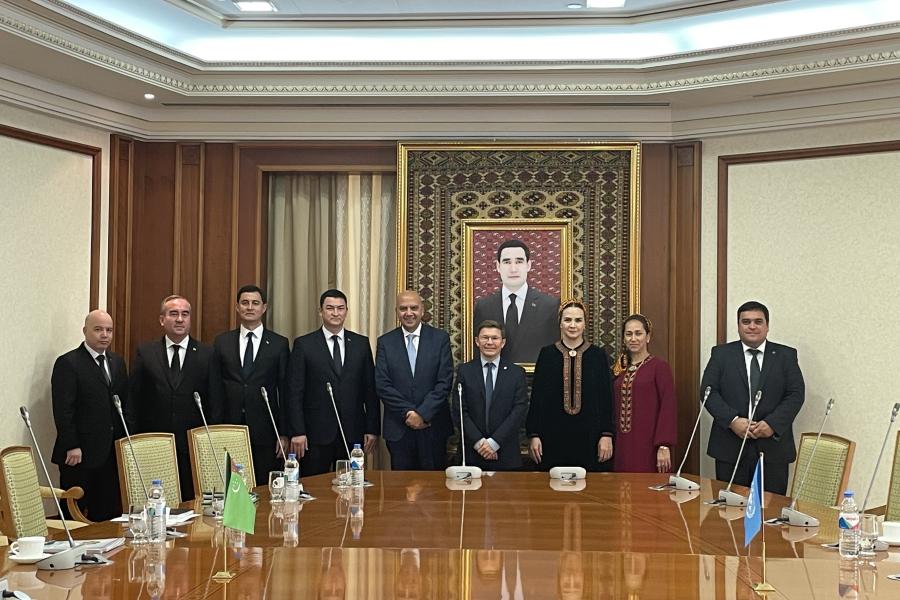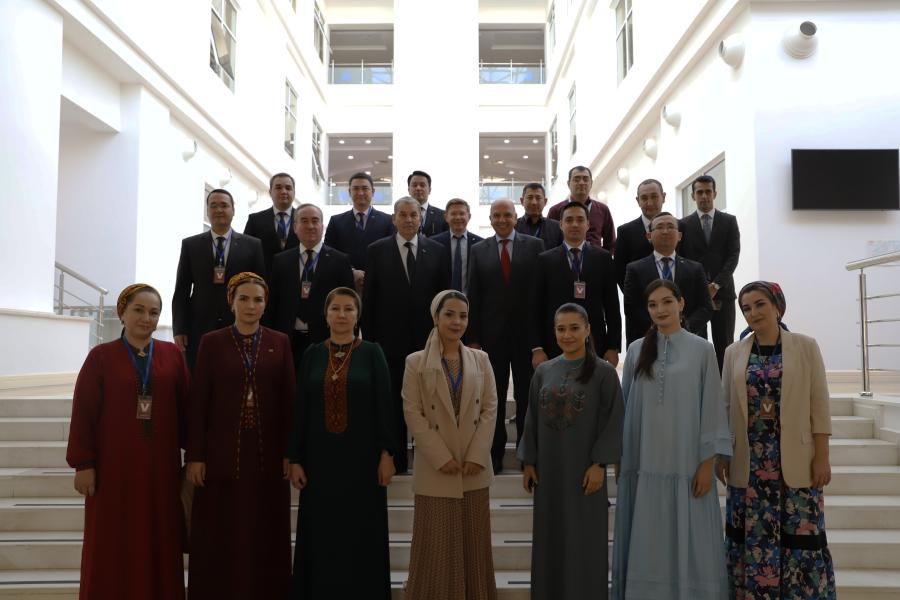Resident Coordinator’s Office in Turkmenistan organized policy dialogues and training on Public-Private Partnerships for SDGs for state authorities and private business
23 oktýabr 2023
Ashgabat, 20 October 2023 – United Nations Resident Coordinator’s Office in Turkmenistan, jointly with the United Nations Economic Commission for Europe (UNECE) and the Ministry of Finance and Economy (MoFE) of Turkmenistan hosted a training on Public-Private Partnerships (PPPs) for SDGs for state authorities and private businesses. The training was combined with policy dialogue both in joint and bilateral meetings with the MoFE, Transport Agency, Arkadag City authorities, Union of Industrialists and Entrepreneurs and EBRD. The joint discussions and leading expert presentations were designed to help participants understand the benefits of PPPs for developing infrastructure projects that support achieving the Sustainable Development Goals (SDGs).
The strategic importance of developing PPPs for implementing the SDGs in Turkmenistan was stressed by Mr. Serdar Jorayew, the Minister of Finance and Economy of Turkmenistan, during the presentation of the 2nd Voluntary National Review of SDG at HLPF in New York.
Public-Private Partnerships (PPPs) are contractual arrangements between the public and private sectors, where the private sector provides a public service or infrastructure asset under a long-term contract. PPPs can be used to finance and deliver a wide range of infrastructure projects, including roads, bridges, schools, hospitals, and energy projects. UNECE is the leading international organization in the field of PPPs that provides technical assistance to governments and private sector partners to develop and implement successful PPP projects. UNECE also works to promote international best practices in PPPs and to develop standards and guidelines for PPP projects.

During the dialogue at the Ministry of Finance and Economy Mr. Atajan Atajev, Director of Strategy and Sustainable Development Department, highlighted the importance of PPPs in supporting the country's economic development and achieving the SDGs. He noted that the new PPP law of Turkmenistan, adopted in 2021, creates a favorable environment for PPP development. In turn, Mr. Tony Bonnici, Chief of the UNECE Public-Private Partnerships Section, emphasized the role of PPPs in supporting countries to achieve the SDGs. He noted that PPPs can be used to finance and deliver a wide range of infrastructure projects, including renewable energy, transport, and education. The Ministry of Finance and Economy welcomed the UNECE support in reviewing the secondary legislation and developing guidelines on PPP projects for the line ministries.
The follow up training was organized in a hybrid format and led by Mr. Tony Bonnici with leading UNECE experts in economic and social infrastructure projects for 20 representatives of the ministry of finance and economy, Transport Agency, Arkadag City administration and representatives of the Union of Industrialists and Entrepreneurs of Turkmenistan.

The core of training focused on PPP cases in the sectors of renewable energy, smart cities and digital services (including smart transport and energy/waste/water management, telemedicine, and electric car charging stations), transport sector (highways and corridors), IT-technologies, digital infrastructure and e-commerce, housing and communal services and education services. The UNECE and other international organizations included Mr Arthur Smith, United States, Mr Ulan Danilbekov, PPP Center of the Kyrgyz Republic, Ms Petra Ferk, Institute for PPP, Slovenia, Mr Nasser Massoud, Managing Director, Concept Realisation, UAE, Mr Dragutin Nenezić, Expert in PPPs and Concessions, Serbia, Ms Stacy Sinclair, Partner at Fenwick Elliott LLP, UK, and Ms Sedef Yavuz-Noyan, Head, PPP Department, Presidency of Turkish Republic, Strategy and Budget Office, Türkiye.
The presentation by the Ministry of Finance and Economy featured the main elements of the PPP law of 2021 and the current work on secondary legislation.
Mr Vladimir Valetka, UN RCO Economist, stressed that all discussed Turkmenistan’s sectors prioritizing PPPs have multiplier effects and need to be costed as part of the SDG Financing Strategy linked to the integrated national financing framework (INFF) enabling SDG financing. In that case public finances magnified with investments from private sector, both national and international, should sustain financing the SDGs in Turkmenistan. UNECE’s methodology of PPP and Infrastructure Evaluation and Rating System (PIERS) [1] is a very useful tool to attest to the overall sustainability of PPP and infrastructure projects.
The participants also had the opportunity to discuss and share their experiences with PPPs. In conclusion, a panel discussion was held on the priority steps for enabling PPPs in Turkmenistan. The participants have reached a consensus that PPPs are critical to support the country's socio-economic development and the UN Joint Programme would be a right step to pilot PPPs for achieving the SDGs in the country. The Joint Programme combining expertise of UN agencies could focus on continuation of capacity development, including study tours, for civil servants from the prioritized sectors, using of international legal best practices in developing secondary legislation and implementation guides for public officials. The programme could support practical implementation of a PPP pilot in Arkadag City launching electric car charging stations integrating solar panels.
The seminar was a valuable opportunity for participants to learn about PPPs and to share their experiences. The knowledge and insights gained from the seminar will help Turkmenistan to develop and implement effective PPPs in support of the SDGs, and the 17th SDG “Partnership for Goals” in particular.





